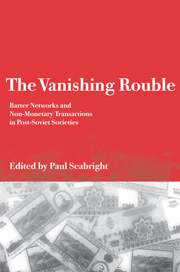Book contents
- Frontmatter
- Contents
- List of figures
- List of tables
- List of boxes
- Preface
- List of contributors
- Introduction: barter networks and ‘information islands’
- I Theory
- II Large-scale empirical studies
- III Ethnography
- 10 How is barter done? The social relations of barter in provincial Russia
- 11 Shadow barter: economic necessity or economic crime?
- 12 Surrogate currencies and the ‘wild market’ in Central Siberia
- 13 Bear skins and macaroni: the social life of things at the margins of a Siberian state collective
- Conclusion: what is to be done?
- Index
12 - Surrogate currencies and the ‘wild market’ in Central Siberia
Published online by Cambridge University Press: 05 May 2010
- Frontmatter
- Contents
- List of figures
- List of tables
- List of boxes
- Preface
- List of contributors
- Introduction: barter networks and ‘information islands’
- I Theory
- II Large-scale empirical studies
- III Ethnography
- 10 How is barter done? The social relations of barter in provincial Russia
- 11 Shadow barter: economic necessity or economic crime?
- 12 Surrogate currencies and the ‘wild market’ in Central Siberia
- 13 Bear skins and macaroni: the social life of things at the margins of a Siberian state collective
- Conclusion: what is to be done?
- Index
Summary
Introduction
Caroline Humphrey's research on rural and industrial barter in Buriatiia (1991, 1998) and Nepal (1985, 1992) has alerted the attention of economists, sociologists, and anthropologists to the persistence of an economic form often thought to be cumbersome, simple and primitive. In contrast to the orthodox assumption that barter ‘naturally’ gives way to monetarised exchange owing to reduced ‘transaction costs’ and the ‘comparative advantage’ of a wider division of labour, Humphrey's work demonstrates that in many social contexts monetary exchange can be risky and most significantly may compromise local networks of mutual aid and solidarity. Perhaps it is not surprising that barter is ourishing in that region of the world where local forms of tenure and economic practice have been under sustained attack first by the administrative tools of state socialism, and now through the austerity measures imposed by international monetary bureaucracies. This chapter presents ethnographic data on ‘surrogate’ forms of monetary exchange gathered during the Russian financial crisis of the autumn of 1998 in two neighbouring regions of central Siberia: the Evenki Autonomous District and the Republic of Khakasiia. The data, although gathered during a particularly sharp moment in the history of Russian monetary instruments, are broadly illustrative of the exibility of form that Russian financial operations can take and moreover clearly expose the nature of the social relations which lie behind paper commodity transfers of wealth.
- Type
- Chapter
- Information
- The Vanishing RoubleBarter Networks and Non-Monetary Transactions in Post-Soviet Societies, pp. 318 - 344Publisher: Cambridge University PressPrint publication year: 2000
- 3
- Cited by



